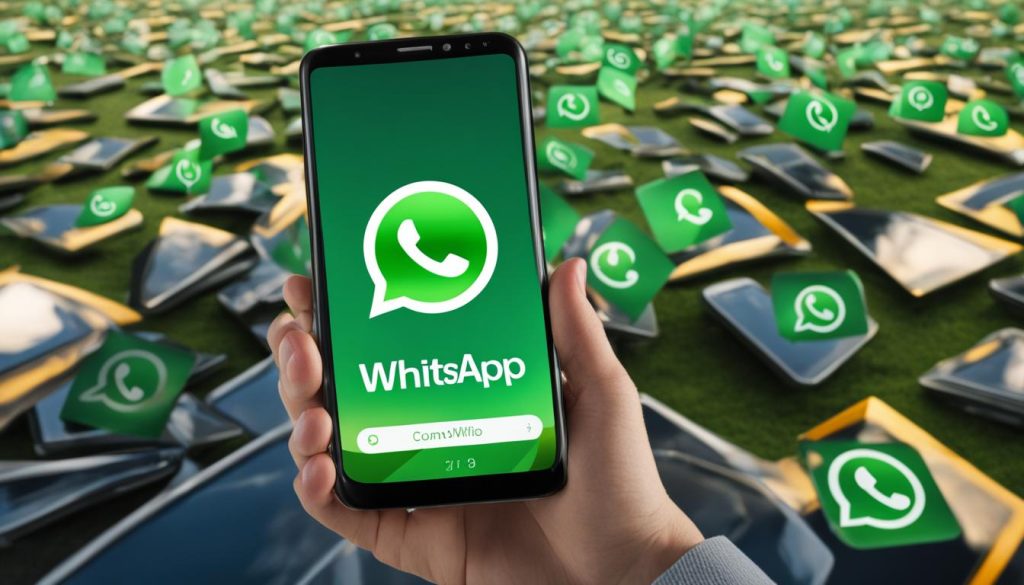Welcome to our article exploring the question of whether WhatsApp qualifies as social media. In today’s digital age, where communication platforms abound, it’s important to understand the distinctions between different apps and their functionalities. WhatsApp is undoubtedly a widely used messaging platform that has revolutionized the way we connect with others. But does it go beyond messaging to be considered social media? Let’s delve into the debate and shed some light on this intriguing topic.
Key Takeaways:
- WhatsApp’s categorization as social media is a subject of debate.
- Some argue that WhatsApp exhibits key features of social media, such as profile creation and content sharing.
- WhatsApp’s massive user base and social interaction features contribute to its consideration as a social media platform.
- The distinction between social media platforms and messaging apps lies in the purpose of broadcasting messages versus one-on-one or small group communication.
- Understanding WhatsApp’s categorization has implications for mental wellbeing and marketing strategies.
Characteristics of WhatsApp as a Social Media Platform
WhatsApp, known primarily as a messaging app, also exhibits several key features of traditional social media platforms. Users can create profiles and add profile pictures, allowing for personalization and self-expression. Additionally, WhatsApp enables the sharing of user-generated content, including photos, videos, and voice recordings, similar to other popular social media platforms. This feature promotes social interaction and content sharing within the app’s extensive user base.
One notable social media-like feature of WhatsApp is the “status sharing” option, which allows users to share media that is visible to their contacts for 24 hours. This feature, akin to Instagram and Facebook stories, encourages users to regularly engage with the app and share moments from their lives with their connections. Furthermore, WhatsApp facilitates social networking through its ability to keep track of online contacts and support private conversations through text, video, and audio calls. These aspects enhance the social experience and make WhatsApp more than just a messaging app.
WhatsApp’s integration of social media characteristics, coupled with its massive user base, demonstrates its potential as a social networking app. Users can connect, share content, and engage in conversations, similar to other social media platforms. This unique combination sets WhatsApp apart from traditional messaging apps and suggests that it can be considered a versatile tool for social interaction and networking.
| Traditional Social Media Platforms | ||
|---|---|---|
| Profile Creation | ✓ | ✓ |
| Content Sharing | ✓ | ✓ |
| Status Sharing | ✓ | ✓ |
| Social Networking | ✓ | ✓ |
Table: A comparison between WhatsApp and traditional social media platforms.
The Distinction Between Social Media Platforms and Messaging Apps
In order to understand the role that WhatsApp plays in the social media landscape, it is important to differentiate between social media platforms and messaging apps. While there may be some overlap in functionality, distinguishing between these two categories helps us better understand the purposes of different applications and manage our time spent online.
Social media platforms, such as Facebook, Twitter, and Instagram, are designed for broadcasting messages to a wide audience. They allow users to share content with their followers, engage in public conversations, and establish an online presence. On the other hand, messaging apps like WhatsApp, WeChat, and iMessage prioritize communication between individuals or small groups. Their main focus is facilitating one-on-one or private group conversations.
While it’s true that WhatsApp possesses some characteristics of social media platforms, such as profile creation and content sharing, its primary purpose is still messaging. Unlike social media platforms, WhatsApp is not built for broadcasting messages to a large audience, but rather for private and personal communication.
Understanding the distinction between social media platforms and messaging apps helps us navigate the digital world more efficiently and effectively. It allows us to choose the right tools for our needs and make conscious decisions about the time we spend on different applications. By recognizing the purpose of each platform, we can strike a balance between staying connected and maintaining our privacy.
WhatsApp’s Impact on Mental Wellbeing and Marketing
WhatsApp’s classification as either a social media platform or a messaging app has significant implications, both for mental wellbeing and marketing strategies. Let’s explore how WhatsApp influences these areas.
Mental Wellbeing: In an era marked by constant connectivity, concerns about the impact of social media on mental health are widespread. However, WhatsApp’s focus on one-on-one or small group communication sets it apart from traditional social media platforms. This distinction can have a positive effect on mental wellbeing. By engaging in personal conversations with close friends and family, individuals can maintain meaningful connections without exposing themselves to the pressures and comparisons often associated with social media. WhatsApp offers a space for authentic interactions that promote genuine connections and contribute to overall mental wellbeing.
Marketing: While social media platforms are designed for targeted marketing and advertising, messaging apps like WhatsApp require a different approach. Invasive practices, such as contacting individuals on private messaging platforms for marketing purposes, can be detrimental to a brand’s reputation. Understanding the distinction between social media and messaging apps is crucial for marketers to execute effective strategies. By recognizing that WhatsApp is primarily a communication tool, brands can focus on building relationships, providing relevant content, and utilizing social selling techniques to engage with their audience in a respectful and appropriate manner.
WhatsApp, with its versatile nature, provides the opportunity for meaningful connections and targeted marketing efforts. Understanding its impact on mental wellbeing and the differences between social media and messaging apps allows individuals and brands to make the most of this unique platform.

Table: A Comparison of Social Media and Messaging Apps
| Category | Social Media Platforms | Messaging Apps |
|---|---|---|
| Primary Purpose | Broadcasting messages to a wide audience | Facilitating one-on-one or small group communication |
| Content Sharing | Wide-scale sharing of content with followers | Sharing content with selected individuals or groups |
| Social Interaction | Public interactions with a broader network | Private and personal interactions |
| Marketing Practices | Targeted advertising and sponsored content | Social selling techniques and personalized outreach |
Table: A comparison of social media platforms and messaging apps, highlighting their differences in purpose, content sharing, social interaction, and marketing practices.
Conclusion
In conclusion, the question of whether WhatsApp can be classified as social media remains debatable. While primarily a messaging app, WhatsApp exhibits several characteristics of social media platforms. Users can create profiles, share photos and videos, and engage in social interaction with their contacts. However, it is important to distinguish between social media platforms and messaging apps in terms of their purpose and functionality.
WhatsApp’s impact on mental wellbeing and its potential for marketing also highlight the need for a clear understanding of its categorization. By recognizing the distinction between social media and messaging apps, individuals can manage their online engagement more effectively and maintain meaningful connections while reducing exposure to the pressures of social media. Similarly, marketers must respect the different purposes of social media platforms and messaging apps, ensuring that their approaches are appropriate and respectful.
Ultimately, WhatsApp can be viewed as a versatile platform that combines messaging and social media features, providing users with a unique and valuable tool for communication. Its widespread popularity and extensive user base further emphasize the need to analyze its characteristics and implications. As technology continues to evolve, the debate surrounding WhatsApp’s classification as social media will likely persist, prompting further exploration and discussion in the future.
FAQ
The categorization of WhatsApp as social media is a subject of debate. While it possesses several characteristics of social media platforms, it is primarily a messaging app.
WhatsApp allows users to create profiles, add profile pictures, share user-generated content like photos and videos, and utilize a “status sharing” feature similar to Instagram and Facebook stories.
While social media platforms focus on broadcasting messages to a wide audience, WhatsApp prioritizes one-on-one or small group communication.
What is the impact of WhatsApp on mental wellbeing?
Separating messaging apps from social media can promote a healthier mobile experience, reducing dependency on constant social media engagement and the exaggerated self-image often presented on social media profiles.
Marketers need to understand the difference between social media and messaging apps to avoid invasive practices. Recognizing that social media is designed for advertising while messaging apps are for communication ensures a respectful and appropriate approach to reach consumers.
Share this content:






